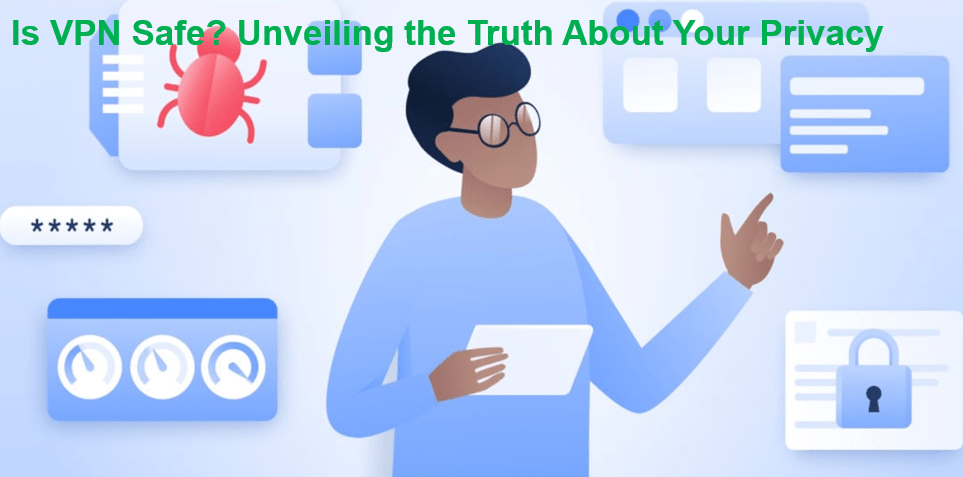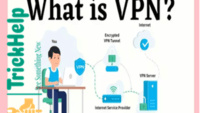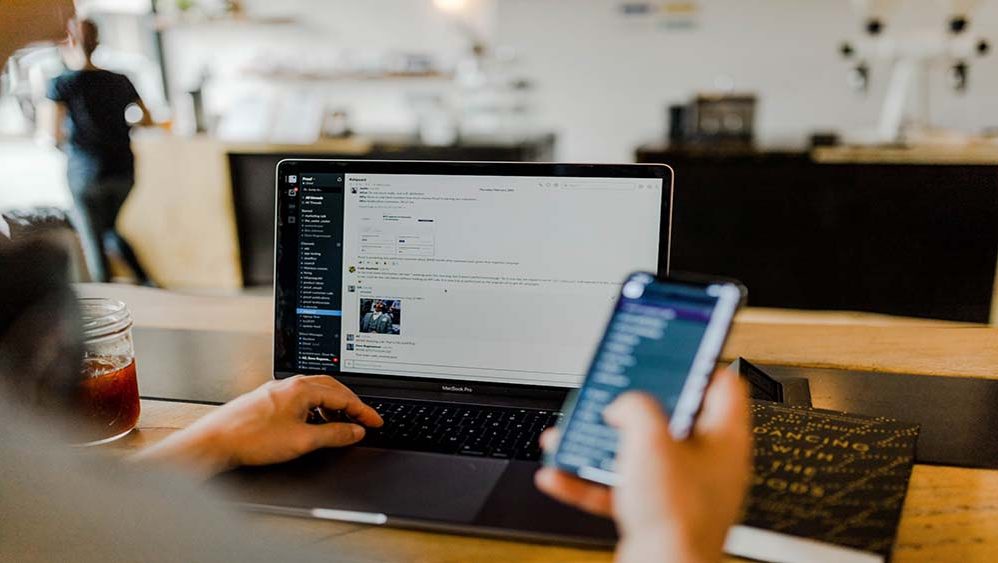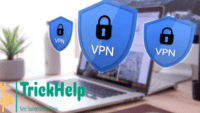VPN safety varies; reliable providers enhance security while others may pose risks. Understanding the VPN’s privacy policy and security features is crucial.
Virtual Private Networks (VPNs) have become a staple for individuals seeking to protect their online activities. They encrypt your internet connection, hiding your IP address from hackers and eavesdroppers. This makes them indispensable tools for ensuring online anonymity and bypassing geographical restrictions.
Users must choose reputable VPN services with strong encryption protocols and a no-logs policy to ensure their data remains secure and private. Reliable VPNs also offer features like kill switches, which protect data leaks if the VPN connection drops. While VPNs increase online safety, selecting a trusted service is critical. Failure to do so can leave users vulnerable to the very privacy invasions they aim to prevent.
Is VPN Safe? Unveiling The Truth About Your Privacy
When it comes to cybersecurity, one of the most frequently touted solutions for maintaining privacy online is a Virtual Private Network, or VPN. But as you navigate through the myriad of options, ads, and tech jargon, you might wonder, Is VPN safe? In this blog post, we pull back the curtain to unveil the truth about your privacy when using a VPN service.
Exploring The Primary Purpose Of VPNs
A VPN’s core function is to provide a secure connection to another network over the internet. Its primary purpose is to shield your browsing activity from prying eyes on public Wi-Fi or even your own ISP. Here’s how a reliable VPN benefits you:
- Anonymizes your internet activity: By masking your IP address, a VPN prevents websites and online services from tracking your browsing habits.
- Encrypted connection: A VPN encrypts data sent and received on your device, providing a secure conduit for sensitive information.
- Access to restricted content: By changing your virtual location, VPNs allow you to bypass geo-restrictions and censorship.
Understanding Data Encryption And Tunneling
The strength of a VPN largely rests upon its encryption capabilities and the process of tunneling. Encryption is like a secret code that only your device and the VPN server can understand; it ensures that even if someone intercepted your data, they would not be able to decipher it. Tunneling, on the other hand, creates a safe passage for the data to travel. This combination makes a robust VPN service a crucial tool for secure communications.
| Encryption Protocol | Security Level |
| OpenVPN | High |
| L2TP/IPsec | Medium |
| PPTP | Low |
Analyzing The Privacy Policy Of Popular VPN Services
Finding a trustworthy VPN service also involves parsing through privacy policies. A truly private VPN service should have a no-logs policy, meaning it doesn’t track or store any information about your online activity. It’s also essential to consider who owns the VPN, the jurisdiction it falls under, and what data is being logged—even if not related to browsing activities.
Consider these key elements when evaluating a VPN’s privacy policy:
- Detailed information about logging practices.
- Transparency about data sharing with third parties.
- Commitment to user privacy in investigatory or legal circumstances.
Only by thoroughly inspecting a VPN’s policy can you ensure the protection of your private information.
VPN Fundamentals And Security Features
When it comes to online privacy and security, a Virtual Private Network, or VPN, is a powerful tool that many individuals and businesses use to protect their internet traffic from snooping, interference, and censorship. Understanding VPN fundamentals and security features is crucial for anyone serious about safeguarding their digital life. Let’s explore the technology and key security protocols that make VPNs reliable, and how features like a kill switch enhance privacy.
VPN Technology Explained
A VPN functions by creating a secure, encrypted tunnel for your data between your device and the internet. This process not only masks your IP address but also ensures that your online activities are inaccessible to outside parties, including cybercriminals, internet service providers, and even governments. The core of VPN technology lies in its ability to use secure servers strategically located across the globe to facilitate private and uninterrupted internet access.
- Encryption: VPNs employ robust encryption algorithms to scramble data, making it unreadable to unauthorized users.
- Server Network: A vast selection of servers allows users to appear as if they are accessing the internet from various locations worldwide.
- Anonymity: By masking IP addresses, VPNs enhance user anonymity online, making it harder to track and target individual users.
Key Security Protocols In Use
VPNs rely on several security protocols, each offering different levels of security and speed. The choice of protocol can affect the VPN’s overall performance and the security of your online activities:
| Protocol | Security Level | Speed |
| OpenVPN | High | Fast |
| IKEv2/IPsec | High | Very Fast |
| WireGuard | High | Fastest |
| L2TP/IPsec | Medium | Medium |
| PPTP | Low | Fast |
Choosing a VPN provider that offers multiple protocols allows users to prioritize speed or security depending on their needs.
The Role Of A Kill Switch In Maintaining Privacy
The VPN kill switch is a critical security feature designed to protect your privacy. If your VPN connection drops unexpectedly, the kill switch automatically blocks your device from accessing the internet, preventing data leaks. This ensures that no unencrypted data escapes, keeping your internet activity and real IP address hidden at all times:
- Automatic Disconnection: Internet access is cut off immediately if the VPN connection fails, preventing accidental exposure of sensitive data.
- Continual Privacy: Users remain anonymous as their IP address and browsing activities do not leak during VPN downtime.
- User Control: Most VPN services allow users to customize kill switch settings according to their privacy requirements.
In summary, VPNs offer a robust set of tools and protocols designed to keep your digital life secure and private. By understanding how these elements work together, you can ensure that your online activities remain confidential and protected against any threats.
Privacy Myths Around VPN Usage
Understanding the true extent of privacy when using a Virtual Private Network (VPN) is a complex matter, rife with misconceptions. As VPNs have become household tools for enhancing online security and privacy, a myriad of myths have surfaced. It’s time to navigate through the fog of misinformation and examine the reality of VPN privacy claims.
Debunking Common VPN Misconceptions
VPN usage is shrouded in a web of myths that often mislead users about the capabilities and protections offered. One of the most persistent misconceptions is the belief that a VPN provides absolute security. While VPNs do encrypt your data, making it much more difficult for it to be intercepted, they are not infallible. Cyber threats such as malware and phishing attacks can still affect users, and it’s essential to pair a VPN with other security practices, such as using antivirus software and being cautious about the websites you visit.
Key points to remember include:
- A VPN encrypts data, but complete digital security needs additional tools and practices.
- VPNs cannot protect against all forms of cyber attacks.
- VPN providers vary widely in the level of security they offer.
The Reality Of VPN’s Anonymity
Another pervasive myth is that VPNs offer complete anonymity on the internet. In reality, while VPNs can mask your IP address and location, providing a significant level of privacy, they don’t make you invisible. Activity could still be traced back to you through other means, such as tracking cookies, browser fingerprinting, or even the VPN service itself if it keeps comprehensive logs. Furthermore, a truly anonymous browsing experience encompasses a lot more than just hiding your IP address.
Consider these factors:
- Browser fingerprinting can identify users despite using a VPN.
- Cookies and website trackers can bypass VPN privacy features.
- Total anonymity online involves more than just a VPN service.
How Safe Logs And No-logs Policies Actually Are
The policy of logging information is a contentious issue within the VPN community. A “no-logs” policy, often advertised by providers, suggests that they do not store any data about your browsing habits or history. Nonetheless, the interpretation of what constitutes a “log” can vary. Some VPN services might not keep activity logs but may retain some connection logs that could include dates, times, or data usage. The safety of using a VPN therefore heavily depends on the integrity and transparency of the provider’s logging policy.
| Type of Log | Potential Privacy Implications |
| Activity Logs | Can reveal browsing history, downloads, and server usage. |
| Connection Logs | May contain connection dates, times, and data volumes used. |
| No Logs | Claims to not retain any identifiable data that can be linked to an individual. |
Essential insights:
- Differentiate between activity logs and connection logs offered by VPN services.
- Scrutinize the transparency of a VPN provider’s no-logs policy.
- Third-party audits can validate a VPN’s no-logs claims, adding a layer of trustworthiness.
Choosing A Safe VPN Provider
Securing your online activities with a Virtual Private Network (VPN) is a smart choice, but Choosing a Safe VPN Provider is crucial to ensure that your data does not fall into the wrong hands. A reliable VPN acts like a secure tunnel between your device and the internet, encrypting your online footprint, and shielding your private information from prying eyes. However, with numerous VPN providers in the market, identifying one that truly safeguards your privacy is paramount. Let’s delve into the core aspects of selecting a trustworthy VPN service.
Essential Criteria For A Reliable VPN
Selecting the right VPN involves scrutinizing various factors that contribute to its reliability and security. Here are key features that a trustworthy VPN should offer:
- Robust encryption protocols to ensure data security
- A strict no-logs policy that guarantees your activities are not recorded or stored
- Kill-switch functionality to protect data from exposure during accidental disconnects
- A substantial server network for stable and speedy connections
- User-friendly policies, with clear terms of service and privacy policy documents
- Regular third-party audits to validate the security and privacy claims of the provider
Investigating The Jurisdiction And Its Laws
The legal environment in which a VPN provider operates can significantly impact the privacy of its users. Consider these aspects:
| Factor | Description |
| Country Jurisdiction | The country’s laws where the VPN is based will dictate how it handles user data. Countries in the 14-Eyes surveillance alliance should generally be avoided due to their data sharing practices. |
| Data Retention Laws | Some countries require providers to retain user data for a certain period, which could compromise privacy. |
| Legal Obligations | Providers may be compelled to disclose user information to authorities, undermining user privacy. |
Evaluating The Transparency of A VPN Service
Transparency is a crucial component of a secure VPN service. Digging deeper into their operations provides insights into their commitment to user privacy:
- Assess the frequency and detail of transparency reports that reveal how the provider deals with data requests.
- Check if the provider undergoes independent audits to verify their security and privacy claims.
- Review the provider’s reputation and user feedback across various platforms to gauge real-world experiences.
- Consider the provider’s level of communication and customer support as indicators of their responsiveness to user concerns.
Potential Vulnerabilities and Misuses
While Virtual Private Networks (VPNs) are heralded for their ability to protect and encrypt Internet traffic, they are not without their flaws. Understanding the intricacies of VPN security is crucial for anyone relying on these services for privacy and safety online. Let’s delve into the concerns underpinning VPNs, from inherent limitations to the dangers posed by free services.
Recognizing VPN’s Limitations and Potential Weaknesses
No digital fortress is impenetrable, and VPNs are no exception. Confronting the reality of these potential weak spots is the first step towards a more secure browsing experience.
- Encryption Standards: Not all VPNs offer the same level of protection. Some may use outdated encryption that can be easily compromised.
- IP Leaks: VPNs can fail, exposing your real IP address, especially during sudden disconnections. This fault negates privacy efforts.
- Server Security: Your data is only as secure as the VPN server’s defense. Compromised servers mean exposed data.
- Log Policies: Make sure to choose a VPN that adheres to a strict no-logs policy, as data retention can pose a significant privacy risk.
The Risks of Using Free VPN Services
Free VPN services often allure users with the promise of cost-free privacy, but the hidden costs can be steep.
| Risk | Description |
| Data Mining | Providers may harvest personal data to sell to advertisers or other third parties. |
| Advertisements | A bombardment of ads can degrade user experience and increase susceptibility to malware. |
| Limited Bandwidth | Some free VPNs restrict data, limiting functionality and speed. |
| Poor Security Protocols | Lack of robust security means increased vulnerability to cyber threats. |
Mitigating Threats to Enhance VPN Safety
Enhancing your VPN’s safety can prevent potential pitfalls, ensuring a safer online experience.
- Research and Verify: Before selecting a VPN, conduct thorough research. Look for independent audits and reviews to confirm its security claims.
- Update Regularly: Keep your VPN application updated to patch vulnerabilities.
- Security Features: OTP for a VPN with kill-switch and DNS leak protection to safeguard your data.
- Reputable Providers: Invest in a reputable VPN service that maintains a transparent, proven no-logs policy and uses industry-leading encryption.
- Configurations: Customize settings for optimal security, including selecting secure protocols and servers.
By recognizing and countering these vulnerabilities, you can bolster your online privacy and make the most of what VPNs have to offer.
Frequently Asked Questions on Is VPN Is Safe
Are VPNs Truly Effective for Online Privacy?
VPNs can significantly enhance online privacy by encrypting your internet connection and hiding your IP address. This prevents unauthorized parties from monitoring your online activities. However, the level of privacy depends on the VPN provider’s policies and technical features.
Can VPNs Protect Against All Cyber Threats?
VPNs are mainly designed to encrypt your internet connection, which helps shield against certain cyber threats like sniffing and man-in-the-middle attacks. However, they do not protect against viruses or malware, which require additional security measures like antivirus software.
Is It Legal to Use A VPN?
Using a VPN is legal in most countries, but it depends on the local laws and regulations. Some countries restrict or regulate the use of VPNs, so it’s essential to check the specific legislation in your region before using a VPN service.
How Do I Choose a Safe VPN Provider?
To choose a safe VPN provider, look for ones with a no-logs policy, strong encryption methods, positive user reviews, and transparency in their operations. Additionally, a provider headquartered in a country with privacy-friendly laws is often a good sign.
Conclusion
Navigating the virtual world securely hinges on the tools we use. VPNs offer substantial protection, yet vigilance remains key. Users should prioritize reputable services and stay informed about evolving security measures. Ultimately, while VPN use enhances online safety, maintaining awareness of potential vulnerabilities ensures a safer browsing experience.
Stay safe online—choose your VPN wisely.






Pingback: What Purpose Use Virtual Private Network (VPN): Unlock Online Freedom & Security TrickHelp
Pingback: What is VPN: Unveiling the Secrets of Secure Browsing | TrickHelp
Pingback: How Can Get Free VPN: Unveil Top No-Cost Providers! | TrickHelp